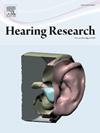Can cognitive performance predict individual differences in speech recognition at a cocktail party?
IF 2.5
2区 医学
Q1 AUDIOLOGY & SPEECH-LANGUAGE PATHOLOGY
引用次数: 0
Abstract
Although cognition is widely assumed to contribute to speech recognition at a cocktail party, the empirical evidence supporting this assumption is surprisingly limited. One reason for this lack of evidence is that cognitive contributions are often tangled with confounding factors such as age and hearing loss. Another reason is that while speech recognition is measured in various backgrounds, cognitive performance is typically measured only in a quiet background. To address these two issues, we measured speech recognition and cognitive performance in both a steady-state noise background and a two-talker babble background in 50 young adults with normal hearing (30 females). To minimize auditory masking, we presented the auditory stimuli for selective attention and digit span tasks to one ear and the background to the other ear. We found that the individual variance in speech recognition was three times greater in the babble background than in the noise background. Compared to the quiet background, noise had no effect but babble degraded performance in selective attention and digit span tasks. Correlation and regression analyses showed that cognitive performance did not significantly contribute to speech-in-noise recognition (r² = 0–11 %), but it explained 26–68 % of the variance in speech-in-babble recognition, with the greatest variance explained when cognitive performance was measured in the babble background. The present study demonstrates that under controlled conditions, cognitive performance can predict individual differences in speech recognition at a simulated cocktail party.
认知表现能否预测鸡尾酒会上语音识别的个体差异?
尽管人们普遍认为认知有助于鸡尾酒会上的语音识别,但支持这一假设的经验证据却令人惊讶地有限。缺乏证据的一个原因是,认知的贡献往往与年龄和听力损失等混杂因素纠缠在一起。另一个原因是,虽然语音识别是在各种背景下测量的,但认知表现通常只在安静的背景下测量。为了解决这两个问题,我们测量了50名听力正常的年轻成年人(30名女性)在稳态噪声背景和双说话人牙牙学语背景下的语音识别和认知表现。为了最大限度地减少听觉掩蔽,我们将选择性注意和数字广度任务的听觉刺激呈现在一只耳朵上,将背景音乐呈现在另一只耳朵上。我们发现,在胡言乱语背景下,语音识别的个体差异是噪声背景下的三倍。与安静背景相比,噪声对幼儿的选择性注意和数字广度任务没有影响,但咿呀学语会降低幼儿的表现。相关分析和回归分析表明,认知表现对噪音语音识别的贡献不显著(r²= 0 - 11%),但它解释了26 - 68%的语言识别方差,其中在牙牙学语背景下测量认知表现时解释的方差最大。目前的研究表明,在受控条件下,认知表现可以预测模拟鸡尾酒会上语音识别的个体差异。
本文章由计算机程序翻译,如有差异,请以英文原文为准。
求助全文
约1分钟内获得全文
求助全文
来源期刊

Hearing Research
医学-耳鼻喉科学
CiteScore
5.30
自引率
14.30%
发文量
163
审稿时长
75 days
期刊介绍:
The aim of the journal is to provide a forum for papers concerned with basic peripheral and central auditory mechanisms. Emphasis is on experimental and clinical studies, but theoretical and methodological papers will also be considered. The journal publishes original research papers, review and mini- review articles, rapid communications, method/protocol and perspective articles.
Papers submitted should deal with auditory anatomy, physiology, psychophysics, imaging, modeling and behavioural studies in animals and humans, as well as hearing aids and cochlear implants. Papers dealing with the vestibular system are also considered for publication. Papers on comparative aspects of hearing and on effects of drugs and environmental contaminants on hearing function will also be considered. Clinical papers will be accepted when they contribute to the understanding of normal and pathological hearing functions.
 求助内容:
求助内容: 应助结果提醒方式:
应助结果提醒方式:


